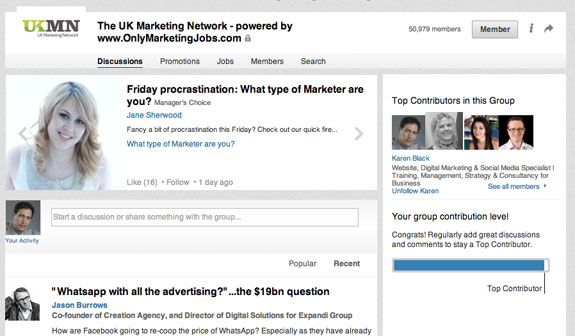 One of LinkedIn’s most hated policies is SWAM – site-wide auto moderation. This means that if you post on a group, and the moderator decides to ban you for any reason, all your posts to all groups you belong to must be reviewed by a moderator before they appear.
One of LinkedIn’s most hated policies is SWAM – site-wide auto moderation. This means that if you post on a group, and the moderator decides to ban you for any reason, all your posts to all groups you belong to must be reviewed by a moderator before they appear.
The result has been that many users – the exact number is unclear, but LinkedIn itself estimates 100-200,000 – have been unable to post to LinkedIn groups, often for unfair or unclear reasons, and have lost valuable business opportunities. Many others have been extremely cautious about how they use the groups because they do not want to be upset the moderators and be SWAMmed (yes, it’s now a verb).
Recently, Forbes ran a piece describing the level of aggravation amongst users and claiming that many SWAM victims are defecting elsewhere.
But did LinkedIn actually respond to the criticism, but forget to tell anyone?
Last week, I came across a post on Google+ claiming that a product manager at LinkedIn, Daria Axelrod Marmer, had posted the following message on the LinkedIn Group Products Forum:
“Thank you for your active feedback about Groups features. Over the last year we’ve listened to your feedback about our spam fighting policies. We have heard that the permanent state of moderation is too severe, especially for a first time offense, and the lack of transparency to users when their posts are submitted to moderation is frustrating.
We are committed to keeping groups as Spam-free as we can, and in that vein we are in the process of introducing a new system which is 1) based on members’ contributions and 2) is fully transparent to the member 3) imposes only temporary moderation.
As a part of these changes, Groups-wide moderation will become temporary. Moving forward, moderation in multiple groups will be triggered in one of two ways
- When a moderator blocks and deletes a member from a group
- When posts, contributions or comments have been marked as spam or flagged for not being relevant (e.g. a job or promotional post was shared to the main group discussion). The length of time this moderation lasts will be temporary and is based on the cause of the moderation.
In the majority of cases, moderation will be resolved within a few weeks.
Lastly, members who are in the new moderation state will now see messaging along the right side of the page that informs them that their Groups posting status has temporarily changed.”

There seem to be two major changes: SWAM will be temporary; and from now on, it’s not only the moderators who will be able to trigger it, but other members of the group who have flagged content as spam or irrelevant.
Whilst the first would be a major step forward, the second seems to be a serious regression, because it would mean that companies could maliciously flag their competitors’ content, triggering a SWAMming.
I wrote to Ms Axelrod Marmer for clarification, and to make sure the post was genuine, and received a reply from a Groups Specialist who referred me to the LinkedIn Help Centre post on auto-moderation.
It appears that this was updated on 21/2, and now includes the following points:
When a group member’s recent contributions to a group are marked as spam or flagged for not being relevant, that member’s posts to all their other groups are automatically subject to approval by group management before being posted. If your posts are being moderated, here are some things to know:
* The length of time your posts will be submitted for moderation typically lasts a few weeks. This can vary depending on the number of occurrences.
So it looks like both those changes are real. Just how long is ‘temporary’? How will this affect people who are already SWAMmed? How is LinkedIn going to stop companies using SWAM to maliciously get their rivals barred? All this remains to be seen (and when it comes to the latter, I’m willing to bet they won’t).
Have you been affected by SWAM? Do you think these are good changes? Let us know in the comments!
Danny Bermant is Director of Brainstorm Digital.
If you liked this post, you might enjoy:
- 9 features that would dramatically improve LinkedIn
- Why you mustn’t overly rely on Facebook to promote your business
- Why your competitors might be your closest ally on social media




